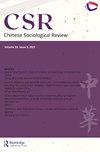“Just a virus” or politicized virus? Global media reporting of China on COVID-19
IF 1.4
2区 社会学
Q2 SOCIOLOGY
引用次数: 1
Abstract
Abstract This study examines how China was covered and framed in global media reporting during the early stage of the coronavirus pandemic. Relying on a global multilingual COVID-19 online news narratives dataset, we propose multidimensional indicators to assess cross-country and cross-period variations in media discourses on China throughout the year of 2020. We derive and assess two hypotheses to explore factors accounting for the variations. The ideology-conflict hypothesis argues that the ideology distance from China determines the media attention and framing toward China in terms of COVID-19 reporting, while the crisis-mitigation hypothesis emphasizes that the domestic pandemic situation is associated with media discourses on China. Empirical analysis based on data compiled from various sources finds no evidence for the ideology-conflict hypothesis and moderate support for the crisis-mitigation hypothesis. Changes in the coronavirus situation and policy reactions are associated with changes in media coverage of China and the use of politicized terms over time. We conclude by discussing the implications of using online media data to understand the COVID-19 infodemic and its contribution to the emerging field of computational sociology.“只是一种病毒”还是政治化的病毒?全球媒体对中国新冠肺炎的报道
摘要本研究考察了在冠状病毒大流行的早期阶段,全球媒体报道是如何报道和陷害中国的。基于全球多语言新冠肺炎在线新闻叙述数据集,我们提出了多维度指标,以评估2020年全年媒体对中国话语的跨国和跨时期变化。我们推导并评估了两个假设,以探索导致差异的因素。意识形态冲突假说认为,意识形态与中国的距离决定了媒体在新冠肺炎报道方面对中国的关注和框架,而危机缓解假说则强调,国内疫情与媒体对中国的论述有关。基于各种来源的数据进行的实证分析没有发现意识形态冲突假说的证据,也没有发现对危机缓解假说的适度支持。随着时间的推移,新冠疫情和政策反应的变化与媒体对中国报道的变化以及政治化术语的使用有关。最后,我们讨论了使用在线媒体数据来理解新冠肺炎信息传播的影响及其对计算社会学新兴领域的贡献。
本文章由计算机程序翻译,如有差异,请以英文原文为准。
求助全文
约1分钟内获得全文
求助全文

 求助内容:
求助内容: 应助结果提醒方式:
应助结果提醒方式:


